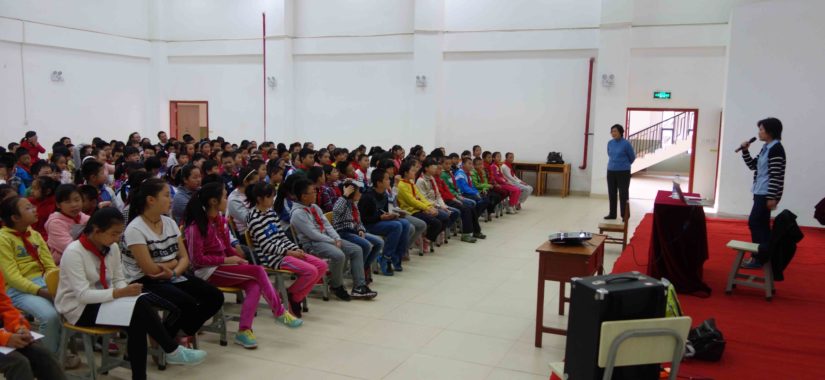
Needs of Counseling Help in China
This report allows readers to see my viewpoint on the need of counseling in China. There is no statistics; just simple personal observations during the four trips I took since 2010. Please keep in mind that the location and the size of the cities do impact my observation. The cases I described are the snapshots of cases I observed in my trips. I divide the needs into different sections: marriage, parenting, youth, young adult, church needs.
Marital Issues In the States, I counseled several women whose husbands have another family or lover in China. There is a saying, “Red Flag flying high at home, color flags swaying outside.” It means that the man would handle his wife well at home and keep many concubines outside the home. When confronted, the husband doesn’t see anything wrong with the situation. Some of them would even try to convince their wives that it is just another way of life. Some would take pride in this life style in that being able to keep lovers signifies that they are affluent. There is a saying among the wives in the States that if the husband seeks to return to China without the family going with them, the ratio for the husband having affairs is 100%. Many of these cheating husbands use an old saying in China goes, “it’s natural to consume in food and sex.” To persuade and calm the wives in the States that it is only nature for man in doing what they are doing. Therefore, the wives must accept and live with the problem.
Most of the church leaders in China are women. Husbands would work to support the family and do not prohibit their wives from taking on full-time positions in serving. One sister told me that she struggles in joggling between marriage and church. Her husband is a Christian and doesn’t object her serving her church or financially supporting the ministry. He works in another city and doesn’t come home every week. When he is at home, his wife is often busy working at church. She has meetings almost every night and weekends are the busiest days of the week. He complains about his marriage and questions its purpose. She tries to cut back the time she serves at church, but has found it difficult to do so because there is no one else to take her place in shepherding the flocks.
Marital problems also manifest in the area of sexual relationships, in-law relationship, and personality differences. A sister has long been living apart from her husband. She has difficulty giving up her current job and moving back home because, if she did so, she would have to live with her mother-in-law. According to her, her mother-in-law is abusive and rude. Her husband is the oldest son, and, in keeping with the village’s tradition, it is impossible for him to move out of his mother’s house. A few times a year she and her husband would reunited at home for a few weeks. She doesn’t like the way they live but has found no resolution to her problem. A married couple, both full-time ministers at a church, also have encountered marital difficulty. They serve together at church, but they fight like dog and cat at home.
Parenting Issue I give a parenting seminar every time I visit Kunming. Many parents send their children to schools like the bilingual Montessori kindergarten for early childhood education. On weekdays, after the children are dismissed from kindergarten, the parents would also take the child to various classes, such as dance, drawing, painting, sports, and music lessons. Does this scenario sound much like that among Chinese parents in North America? Though the situations are similar, China is still at the crossroads between old traditional thought and new ways of thinking. A mother shared with me the story of her struggle. She hopes to bring up her children by disciplining them rather than spoiling them. Her husband is also very supportive. However, her parents are not. The grandparents always coddle and spoil the grandchildren. They would scold her and her husband when the couple tried to discipline their children.
Issues Regarding Teenagers Public High school education in China have residency requirement. To enter into high school, they have to take a high school entrance exam, and their test result determines the high school they are assigned to I met Kung (alias) during my short-term mission trip past April. He was sent home because of conflicts with and disrespect of his teacher. His high school entrance exam score wasn’t ideal. As a result, he was separated from his middle school friends who entered into more academic-driven high school. He commented that those so-called “academic-driven” high school students compete with one another just to achieve high ranks and spend most of their time studying. They have no social life. The high school he was assigned to is second-tier. The students do not study much, even though the school regulates their use of time. Students will get up at around 6 in the morning and go to bed 10 at night. In the evening hour, there are 2 sessions of self-study time. The students would be told to use the time to do their homework and nothing else. They would not be allowed to read anything other than textbooks, even if they have already finished their homework. Some teachers would use those sessions for teaching and/ or for testing. Students would go home on weekends. Even under strict regulations, students would manage to escape from school, skipping class if they don’t like the teacher, and engage in mischief. That affects him too, and his grade falls. For him, he loves biology; he often watched documentary films or books to acquire more knowledge during middle school years. He is prohibited from pursuing his interest during school now. Kung told me that the pressure of living under such strict regulation drives him nuts. He is not violent and yet has often found himself having hard time containing anger. He is like a time bomb ready to explode. His mother brought him to me and is overwhelming with worry. She feels helpless.
Some teens fall behind and would resolve to violence and rebellion. They would be expelled from regular school and sent to a school for juvenile delinquents. One juvenile delinquent ran away from school several times. He told his parents if they kept sending him back, they would be sending him to death. At this kind of school, violence is at the center of its correction of rebellious teens. Some of the teens were even beaten to death.
I visited a privately run teens correctional school in Shanghai. The principle is not a Christian, but he believes in education with love. He wrote the school “Bible” to encourage the student and to boost their self-confidence. He welcomes Christian counselors to work with them, even if holding Bible study. He believes that Christianity
is beneficial to teens.
College student During lunch after the Sunday worship, a college student named MF came to sit with me and shared with me her obsession with a female student. The female student is not a Christian, yet she is the closest person MF has. Their relationship is very exclusive. They would not allow others to come between. MF knows that it does not seem right, yet she could not get out of the relationship. MF loves the Lord and also serves at church in various posts. MF is afraid to be alone and could not find anyone at church who can talk heart to heart with her. MF seems to suffer from co-dependency.
Lilly (alias) is a sophomore majoring in finance. She studies well, but she hates it whenever she thinks about her future base on money counting. Her parents want her to get a good job and live a better life, so they think that studying finance would lead their daughter into financial independence. She considered changing major, yet the college did not permit her to do so. She is wondering what other choices she may have.
Young Adult Issues I have come across a group of young adults in China, they may or may not graduate from high school. They often come from poor, rural families that are struggling to meet ends-need. . All of these young adults work at a golf course. Once their job is stabilized, they will be considering marriage.
A beautiful young Christian sister fell into depression resulting from sexual harassment and exploitation at work. She lacks self-esteem and questions her own ability. Her mother would call her pig because she has gained much weight because of the medication. She has gradually recovered from clinical depression, but she still does not know her self-esteem.
What can we do about them? If you are still reading and your heart is burning with anguish, you are not alone. The scope of the issues I mentioned above is broad. It involves cultural, individual psychological, emotional, and family dynamic aspects. Just to name a few. Those issues are real and may even overwhelming. I don’t want to pretend to have all the solutions. However, by God’s grace and the wisdom given by the Holy Spirit, I hope to share more about what we can do about them during next article. However, if you are professional psychologist or counselors, I welcome your inputs. The Lord has stirred up my heart. May He also stir you up! Those people are not far away. They are “our neighbors.”
